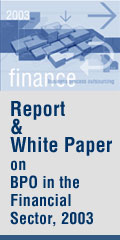|

- Mgt. Courses
- India's Outlook
- BECON-2003
- Micro Finance
- Credit Policy
- Bank Ratings
- Top 15 pages

 Daily News
Daily News
- Banking News
- IT News
- Insurance News
- BPO News
- Market News
 Online Directories
Online Directories
- IT Directory
- BPO Directory
- Bank Directory
- Insurance Cos
 Daily Rates Daily Rates
- Rupee Spot Rates
- Lending Rates
- Stock markets
- FCNR Rates
 Banking
Banking
- Overview
- Basics
- Products
- Articles
- Policies
- More
 Technology
Technology
- Overview
- Major IT Cos
- Banking Software
- Features
- More
 Finance
Finance
- Overview
- Corporate Finance
- M&A & JV
- Venture Capital
- More
 Insurance
Insurance
- Overview
- Regulators
- Bancassurance
- Products
- More
 BPO
BPO
- Overview
- Opportunities
- News & Trends
- More
 Publications
Publications
- BPO Report
- Doing business
- Outsourcing
- NRI Handbook
- Directory
- More
 More sections
More sections
- Jobs
- Management
- NRIs
- Co-op Banks
- Lifestyle
|
Click Here To Return To Daily News
Click For Other Top Stories
Companies incorporated outside the country can now raise resources from the Indian capital market by means of IDR. IDR means any instrument in the form of depository receipt created by the domestic depository in India against the underlying equity shares of the issuing company.
The rules stipulate that IDRs should not be redeemed into underlying equity shares before the expiry of the one-year period from the issue date.
All IDR issuances should have the prior nod of SEBI. The rules on IDRs, prescribed by the Government, do not require listing of the IDRs in a foreign bourse. It only require listing of IDRs in recognised stock exchanges in India. However, it is mandatory for the issuing company to have an established place of business in India.
An issuing company will need to pay SEBI, a non-refundable fee of $10,000 along with its application. On being granted the permission, an applicant would have to pay an issue fee of half a per cent of the issue value subject to minimum of Rs 10 lakh where the issue is up to Rs 100 crore. Further, where the issue value exceeds Rs 100 crore, every additional value of issue would be subject to a fee of 0.25 per cent of the issue value.
Companies will need to have pre-issue paid-up capital and free reserves of at least $100 million and an average turnover of $500 million during the three financial years preceding the issue. Further, the IDRs issued by any issuing company in any financial year should not exceed 15 per cent of its paid-up capital and free reserves.
Besides, the issuing company should have been making profits for at least five years preceding the issue and should have declared a dividend of not less than 10 per cent each year for the said period. It should also have a pre-issue debt equity ratio of not more than 2:1. A resident holder of IDRs may transfer or ask the domestic depository to redeem the IDRs, subject to the provisions of the Foreign Exchange Management Act, 1999 and other laws being in force.
.... Click for Global Market Funding
.... Click for more Policies
|
|
|
|
|
|
|
|
|
|
|
|
|
|
|
|
|
|
|
|
|
|
|
|
|
|
|
|
|
|
|
|
|
|
|
|
|
|
|
|
|
|
|
|
|
|
|
|
|
|
|
|
|
|
|
|
|
|
|
|
|
|
| |

-----------

-----------

-----------

|




